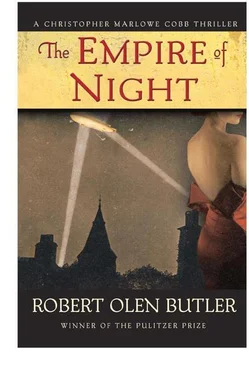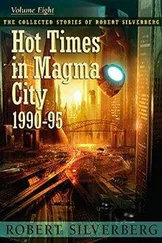She moved along, singing, “Overseas there came a pleading, help a nation in distress,” and Buffington extended his hand and she took it and she sang to him and I had the same first, fleeting hunch about him. She was working for Trask, but she was sleeping with Buffington. And then I felt like the punk kid I once was, standing outside a closed door in a theatrical boarding-house trying to will his mother to live her life in some other way. What way, I couldn’t imagine, just some other way.
But in fact I was thirty-one years old and she was fifty-six and we had long ago disentangled ourselves from our shared life. And rightly so. We wrote letters. An occasional telegram. But all of that was strictly private. As public as I had subsequently become and as she had always been, it was not really known — outside of a few of my journalist pals and the close-knit tribe of American theater people — that we were mother and son.
She let go of her host’s hand and I let go of the hunch and she moved off to the next table to urge everyone to keep the home fires burning while their hearts were yearning.
I thought of her lying to me in her dressing room. No. She hadn’t lied. It was no doubt true that she was not now working nor would she ever work again for a detective agency. But she didn’t say anything at all about working for the U.S. secret service. She’d convinced me about the Pinkertons by invoking her ego. Her ego would be thoroughly satisfied playing the role of spy for her country. Just the thing for a great actress who was furious with the theater for not overlooking her advancing age. As a spy she could still be a glamorous leading lady. And her performance had a special edge: her life could depend on it being convincing.
I turned around in my chair, shut out her voice, poked at a roasted potato.
My mother segued from the home fires into an upbeat “Pack Up Your Troubles in Your Old Kit Bag,” and then she finished with an even more achy “There’s a Long, Long Trail.”
The music stopped, the gentlemen cheered, she left, and a rhubarb crumble arrived. In the midst of all this, Buffington rose and followed her up the circular stairway and Trask turned to me as the ramekins landed before us.
“Your mother is working for us,” he said.
“I surmised,” I said.
And though I felt the irony, given my recent bout of musty hunches, I asked the obvious question. “Is she going after Sir Albert?”
“Yes,” Trask said.
And then he added, “So are you.”
The next night Isabel Cobb ended her run in London as Hamlet, Prince of Denmark. She’d swept out of her basement cabaret on the night of the most recent Zeppelin attack on London and it wasn’t until Friday morning that I saw her again, when she stepped into a first-class compartment at Victoria Station for the train to Broadstairs in Kent and she sat down across from the American journalist and German apologist Joseph W. Hunter.
Trask had booked the compartment so that she and I would be alone. But she entered playing a stranger, nodding at me and then ignoring me as she settled in, arranging her handbag next to her just so, its corners squared to the edge of the upholstered bench seat. I watched this with a vaguely squirmy sense of recognition. I always did that very thing with the pages of a story as they came out of my typewriter.
She finished with her bag and then smoothed her overskirt, though it hardly needed smoothing. It was a stage gesture. She looked quite summery in a blueberry bolero jacket and straw boater with a matching ribbon and pleated bow.
She turned her face to me now, even as I was thinking how she looked pretty good, and she tightened her forehead as if I were a young man on the mash.
I refused to play along. “We have the compartment to ourselves, Mother,” I said, in a tone of We both know this, so what are all the theatrics for?
She flared her hands in front of her. “Can’t we have a little fun, my darling? Improvisation? How long has it been since we rode a train together? We used to have so much fun.”
I shrugged and looked out of the window beside me. A conductor strode past blowing his all-aboard whistle.
“You were always a clever boy,” she said. “A talented boy.”
We rode enough trains together between theater towns to circle the earth and circle it again. For as long as I could think back, we would play roles together to pass the time. Over the years, I was everyone from a beggar boy running away from an orphanage to a dry goods commercial traveler who was Isabel Cobb’s biggest fan and overwhelmed to meet her. She once had hopes I’d follow her into the theater.
The train was moving now, and I turned back to Mother. She was watching out the window. Her face was blank. I knew the look. I’d seen it often, in stage wings just before she would make her first entrance. This blankness was all she would show of the actor’s inevitable terror of reinventing herself before a thousand strangers watching from the dark.
This time her audience would be smaller and she would walk among them and things were at stake far beyond entertaining a theater crowd.
I knew to let her be. The outward blankness would last until her entrance cue, and then she would come suddenly alive as if she’d flipped an electric light switch. I glanced at her only briefly and stealthily, but her preparatory state went on and on, through our run across the Thames and through Clapham and Herne Hill, with their old estates turning into middle-class commuter houses, and through our plunge into the dark of the long tunnel beneath the Crystal Palace. Here, the electric lights in the compartment flickered us into total darkness. We clattered through the blackness for a long moment, and when the lights flared back on again, I looked frankly at her and she had closed her eyes.
I believed her fear.
I wanted to reach out and take her hand.
But I knew better.
What would she take as her entrance cue on this day?
The lights blinked off once more and then almost instantly back on and her eyes were open, as if they had been all along and what I’d seen was wrong.
But she was still preparing.
Only when we were above ground and finished with London and into the county of Kent and we were rushing through vast hops gardens, the plants beginning to bloom into gold, ready for the seasonal pickers to come down from the slums of London, only then did she turn her face back to me.
“The curtain goes up,” she said.
I nodded.
“What the hell are you doing?” I said.
“What do you mean?”
“This role of yours.”
“And you, my son? I was quite surprised to learn about your own specialized acting career.”
“You already knew about me the other night.”
“Of course.” She leaned forward and patted me on the knee. “Aren’t we having fun?”
There was nothing to say to that. Of course she was.
I decided to watch the hops for a while.
Trask had briefed me before we parted at Buffington’s. I’d been invited to stay the weekend at Stockman House, his family estate high on the chalk cliffs between Broadstairs and Ramsgate. I was following Isabel Cobb, doing a feature story on her for the de facto syndicate of German-leaning American newspapers that were making my reputation. The news hook was the next stop on her tour of Hamlet . Berlin. A detail she deliberately withheld from our discussion of her tour in her dressing room. I was to stay alert to — even, at my discretion, seek out — evidence that Sir Albert was indeed actively aiding the German cause. My mother was doing the same.
“This will be an interesting test of your new identity,” Trask had said.
I wasn’t worried. There had been almost no images of me in the press over these half dozen years of my war correspondent notoriety. I’d insisted on that. My printed words were my public face. There was, however, another issue. I’d said to Trask, “She and I have kept it quiet for more than a decade, but the Germans surely know she’s my mother.”
Читать дальше












